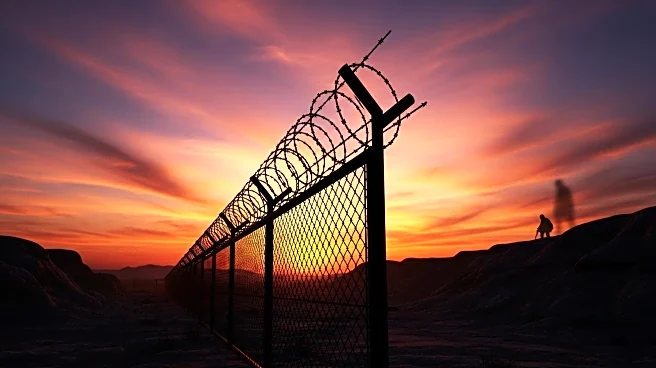What's Happening?
The documentary 'Waking Hours,' directed by Federico Cammarata and Filippo Foscarini, is set to premiere at the Venice Critics’ Week, an independent event during the Venice Film Festival. The film, produced by Volos Films Italia in collaboration with Cosma Film and RAI Cinema, delves into the lives of Afghan people smugglers operating at the border between Serbia and Hungary. The documentary captures the clandestine activities of these smugglers as they facilitate illegal crossings into the European Union. The filmmakers describe the setting as a 'living body' where cinema vérité and theater merge to offer a poetic exploration of the human condition. The film aims to provide an insider perspective on a world rarely seen, challenging viewers to reflect on migration and the human experience.
Why It's Important?
The documentary 'Waking Hours' sheds light on the complex and often dangerous world of human smuggling, a critical issue at the EU's borders. By focusing on Afghan smugglers, the film highlights the broader challenges of migration and border security faced by European nations. This exploration is significant as it provides a humanized view of the individuals involved in these activities, often portrayed negatively in media. The film's unique approach may influence public perception and policy discussions around migration, potentially impacting how governments address border security and humanitarian concerns. It also contributes to the ongoing dialogue about the ethical responsibilities of countries in managing migration flows and protecting human rights.
What's Next?
Following its premiere, 'Waking Hours' may spark discussions among policymakers, human rights organizations, and the public about the complexities of migration and border control. The film could be used as a tool for advocacy, encouraging more humane and comprehensive approaches to migration policies. Additionally, its reception at the Venice Critics’ Week could determine its future distribution and impact on international audiences. The documentary might also inspire further cinematic explorations of migration issues, contributing to a broader understanding and awareness of the challenges faced by migrants and the communities involved in their journeys.
Beyond the Headlines
The film's exploration of migration through a cinematic lens raises questions about the portrayal of migrants and smugglers in media. It challenges stereotypes and encourages viewers to consider the nuanced realities of those involved in illegal border crossings. The documentary's approach may also influence how filmmakers and storytellers address sensitive topics, promoting a more empathetic and informed narrative. This could lead to a shift in cultural perceptions of migration, fostering greater empathy and understanding across different societies.










